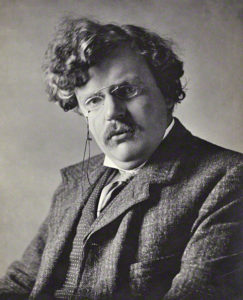G.K. Chesterton, Collected Works, Volume XXXV

G.K. Chesterton wrote a weekly column for The Illustrated London News from the mid-1900s to the mid-1930s. Ignatius Press has assembled his essays into several volumes, as part of its massive Collected Works compilation. Despite being a century old, Chesterton’s insights are just as pertinent today as they were then — in fact, even more so.
Because Chesterton’s ideas are so important, I thought I’d share some of my favorite passages from each volume. With luck they will spark your interest in reading more. The passages below are a mere taste; Chesterton’s most engaging ideas are too involved and too amazing to be boiled down into a short excerpt.
This volume is one I like a lot, but Chesterton’s essays are on the whole too complex to be summarized briefly here. If you are interested in a real education on religion, history, politics and culture, plus a lot of discussion about the state of affairs in the U.S., this book is for you. Get the book here.
“But it would be true to say that the modern man often only essays, or attempts, to come to a conclusion. Whereas the mediaeval man hardly thought it worth while to think at all, unless he could come to a conclusion.” (02-16-1929)
“Those who believe in the dignity of the domestic tradition, who happen to be the overwhelming majority of mankind, regard the home as a sphere of vast social importance and supreme spiritual significance; and to talk of being confined to it is like talking of being chained to a throne, or set in the seat of judgment as if it were the stocks.” (11-16-1929)
“If the mediaeval religion had really been such a silly superstition as some of its simpler enemies represent, it quite certainly would have been swallowed up for ever in such an earthquake of enlightenment as the great Renaissance. The fact that the vision of a superb and many-sided human culture did not disturb the fundamental ideas of these late mediaeval Christians has a simple explanation: that the ideas are true.” (01-18-1930)
“But when any part of the general public is drawn into a debate on physical science, we may be certain that it has already become a debate on moral science.” (02-15-1930)
“Thus, while all over Western Europe are dotted psychological educators luring on little minds with flowers and feathers and coloured ribbons, the barbarians in Eastern Europe, filled with a passion for discipline, are conducting infant instruction with loud bangs, discharges of artillery, and deafening assertions that there is no God.” (02-22-1930)
“The doubts that come with age are not about the ideal, but about the real.” (04-26-1930)
“The moment men begin to care more for education than for religion, they begin to care more for ambition than for education. It is no longer a world in which the souls of all are equal before heaven, but a world in which the mind of each is bent on achieving unequal advantage over the other.” (04-26-1930)
“Now that everybody is talking about the public being informed of this or that, is there any way of stopping the public being misinformed in this endless and exuberant fashion?” (07-12-1930)
“Never until the nineteenth century was it supposed that the Church or Temple was a sort of side-show that had nothing to do with the State.” (07-26-1930)
“A vast amount of darkness and mystification has been brought into the world by the use of the word ‘enlightenment.'” (08-22-1931)
“Nothing so much threatens the safety of democracy as assuming that democracy is safe.” (08-22-1930)
“Nowadays, the young rebels do not want to lay down a rule, but to lay down exceptions. They want to deal with exceptions. They want to be exceptions. I don not say they wish to be regarded as very exceptional people; for that slight error has been common enough in youth, and is not altogether unknown even in age. But they have broken up the scheme of existence into exceptions, which have no real rule to connect them.” (08-29-1930)
